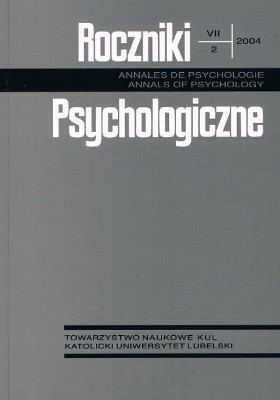Psychological conceptions of areligious experience
Abstract
The article presents psychological conceptions of a religious experience.
The first part presents three definitions of an experience: 1) the empirical concept of an experience – an experience is a sensual perception and its mental processing; 2) the phenomenological concept of an experience – anything given directly to subconsciousness constitutes the object of an experience; 3) the hermeneutical concept of an experience – an experience is a process, a „movement” of consciousness – which leads to comprehension of sometfing, to a particular insight.
The second part of the article presents two conceptions of a religious experience: 1) phenomenological conception of a religious experience; 2) hermenutical conception of a religious experience. The latter pays particular attention to the dialogic, historical and linguistic character of a religious experience.
References
Argyle, M. (2000). Psychology of religion: An introduction. London-New York: Routledge.
Beit-Hallahmi, B., Argyle, M. (1997). The psychology of religious behavior, belief and experience. London: Routledge.
Brzeziński, J. (1996). Metodologia badań psychologicznych. Warszawa: PWN.
Buber, M. (1992). Ja i Ty. Wybór pism filozoficznych. Warszawa: PAX.
Chaim, W. (1991). Psychologiczna analiza religijności niespójnej. Lublin: Redakcja Wydawnictw KUL.
Chlewiński, Z. (2000). Religia a osobowość człowieka. W: H. Zimoń (red.), Religia w świecie współczesnym. Zarys problematyki religiologicznej (s. 89-129). Lublin: Towarzystwo Naukowe KUL.
Czarnocka, M. (1993). Doświadczenie w nauce. Analiza epistemologiczna. Warszawa: Instytut Filozofii i Socjologii PAN.
Dilthey, W. (1982). Grundlegung der Wissenschaften von Menschen, der Gessellschaft und der Geschichte. Göttingen: Vandenhoeck, Ruprecht.
Gadamer, H. G. (1993). Prawda i metoda. Zarys hermeneutyki filozoficznej. Kraków: Inter Esse.
Giorgi, A. (2002). Psychologia jako nauka empiryczna uprawiana z ludzkiej perspektywy. Podejście fenomenologiczne. Białystok: Trans Humana.
Heidegger, M. (1997). Heglowskie pojęcie doświadczenia. W: M. Heidegger. Drogi losu (s. 79-170). Warszawa: Fundacja Aletheia.
Hessen, J. (1962). Griechische oder biblische Theologie. München: E. Reinhardt.
Husserl, E. (1962). Phänomenologische Psychologie. Vorlesungen Sommersemester 1925. Den Haag: Th. Nenon, H. R. Seep.
Ingarden, R. (1963). Z badań nad filozofią współczesną. Warszawa: PWN.
James, W. (2001). Doświadczenia religijne. Kraków: NOMOS.
Król, J. (2002). Psychologiczne aspekty badania fenemonu religii. Podstawy teoretyczno-metodologiczne. Opole: Redakcja Wydawnictw Wydziału Teologicznego.
Krzyżewski, K. (red.) (2003). Doświadczenie indywidualne. Szczególny rodzaj poznania i wyróżniona postać pamięci. Kraków: Wydawnictwo Uniwersytetu Jagiellońskiego.
Otto, R. (1968). Świętość. Elementy irracjonalne w pojęciu bóstwa i ich stosunek do elementów racjonalnych. Warszawa: KiW.
Ożóg, T. (1983). Symbol jako struktura pośrednicząca. Aspekty psychologiczne. Roczniki Nauk Społecznych, 11, 2, 61-75.
Ricoeur, P. (1986). Symbolika zła. Warszawa: PAX.
Scheler, M. (1986). Istota i formy sympatii. Warszawa: PWN.
Schmith, J. E. (1971). Doświadczenie i Bóg. Warszawa: PAX.
Stępień, A. B. (1997). Doświadczenie. W: J. Herbut (red.), Leksykon filozofii klasycznej (s. 119-120). Lublin: TN KUL.
Uchnast, Z. (2002). Doświadczenie osobowe: przedmiot jakościowej analizy personalistycznej. Roczniki Psychologiczne, 5, 5-25.
Welte, B. (1980). Das Licht des Nichts. Von der Möglichkeit neuer religiöser Erfahrung. Düsseldorf: Patmos Verlag.
Whiteley, C. H. (1973). The cognitive factor in religious experience. W: R. E. Santoni (red.), Religious language and the problem of religious knowledge (s. 258-265). London: Harvill Press.
Wolsza, K. (1999). Rola doświadczenia transcendentalnego w poznaniu filozoficznym. Opole: Wydział Teologiczny Uniwersytetu Opolskiego.
Copyright (c) 2004 Roczniki Psychologiczne

This work is licensed under a Creative Commons Attribution-NonCommercial-NoDerivatives 4.0 International License.


